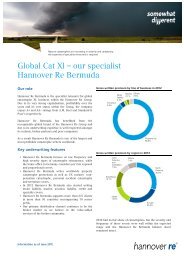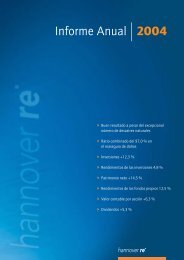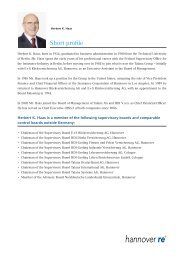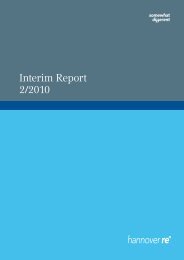Annual Report 2010 - Hannover Re
Annual Report 2010 - Hannover Re
Annual Report 2010 - Hannover Re
You also want an ePaper? Increase the reach of your titles
YUMPU automatically turns print PDFs into web optimized ePapers that Google loves.
In the Eurozone, too, the upsurge in the economy should be<br />
sustained; the ifo-Institute expects GDP to rise by 1.4% overall<br />
in 2011. The differences between member states will likely<br />
remain considerable. In countries with relatively solid public<br />
finances and no major structural problems, such as Germany,<br />
Finland, Austria and the Netherlands, the economy should<br />
grow at an above-average pace and unemployment should fall.<br />
Countries on the European periphery, however, will likely experience<br />
only a sluggish recovery (for example in Spain, Italy<br />
or Ireland) or even recession (for example in Greece). The<br />
enormous repercussions of the crisis and the pressure to consolidate<br />
will be adverse factors here. In 2011 all Eurozone<br />
countries will embark on a course of fiscal consolidation. As a<br />
result, public spending and disposable incomes will likely be<br />
detrimentally affected. The resurgence in domestic demand<br />
will consequently slow.<br />
In China the pace of expansion will likely diminish in 2011,<br />
although it will remain on a high level. An increasingly restrictive<br />
monetary policy will probably play a role here and should<br />
ultimately restrict the growth in economic output to 8%.<br />
In Japan the government and central bank are trying to counteract<br />
the slowdown in economic growth. In November <strong>2010</strong>,<br />
for example, the government approved a further economic<br />
stimulus package, while the Bank of Japan launched another<br />
asset purchasing plan. A more modest rate of expansion than<br />
in <strong>2010</strong> should nevertheless be anticipated.<br />
Capital markets<br />
International bond markets will likely continue to see low<br />
yields in 2011. The first cautious hike in prime rates by the<br />
ECB is not anticipated before the end of 2011 at the earliest;<br />
the US Federal <strong>Re</strong>serve will probably only follow suit in 2012.<br />
As a consequence of the prevailing expansionary monetary<br />
policy, yields on German government bonds will likely remain<br />
on a low level in 2011. The same is true of the United States,<br />
where yields will probably rise only marginally by the end of<br />
2011. Bonds issued by peripheral countries of the European<br />
Monetary Union should, however, remain under pressure.<br />
While the budgetary situation of these countries will likely<br />
improve, concerns about possible insolvency after expiry of<br />
the EU/IMF rescue package will doubtless persist – especially<br />
as regards Greece, Ireland and Portugal. Should the economic<br />
upturn lead to an increase in corporate profits, this would<br />
open up price potential on the equity markets. Any increases<br />
in prices in 2011 will, however, probably be subject to considerable<br />
volatility.<br />
The insurance industry<br />
Having held its ground in the crisis, the international insurance<br />
industry will make another important contribution to<br />
economic stability in 2011. Insurers operate in the field of loss<br />
limitation, loss prevention and risk diversification; in this way<br />
they support economic development. They not only spread<br />
risks across a number of actors, they also help to shape markets<br />
and serve as a catalyst for financing and investments. For<br />
2011 the German insurance industry expects premium income<br />
to contract overall – against the backdrop of the anticipated<br />
decline in income from single-premium business in life insurance.<br />
In the international arena the insurance industry looks<br />
set to expand its role in the economy and society in 2011.<br />
Non-life reinsurance<br />
Overview<br />
We are broadly satisfied with conditions in non-life reinsurance.<br />
The renewals as at 1 January 2011 – the date on which<br />
67% of our treaties in traditional reinsurance were renegotiated<br />
– passed off better for our company than the market players<br />
had generally expected. Despite softer market conditions,<br />
we had sufficient opportunities to write profitable business.<br />
All in all, we were able to enlarge the premium volume by 2%<br />
in this round of renewals.<br />
Even though rates declined sometimes substantially on account<br />
of the healthy capital resources enjoyed by primary insurers<br />
and the absence of market-changing major losses in the<br />
developed markets, we were nevertheless able to maintain<br />
prices on a stable level in many instances – including for example<br />
in US casualty business involving small and mid-sized<br />
risks. As a direct consequence of the heavy loss expenditure<br />
associated with the sinking of the “Deepwater Horizon” drilling<br />
rig we obtained appreciable price increases on covers for<br />
offshore oil exploration. While original rates climbed by<br />
around 20%, price increases of roughly 25% were attainable<br />
in non-proportional reinsurance. We also succeeded in pushing<br />
through higher prices in European motor liability business.<br />
The treaty renewals for US catastrophe business were, however,<br />
disappointing. Rates for the most part declined in the<br />
absence of losses from hurricanes. In keeping with our policy<br />
of active cycle management we reduced our exposure. In areas<br />
where major disasters occurred, such as the earthquake<br />
in Chile, the positive effects on the price level remained within<br />
regional bounds and failed to usher in a worldwide trend<br />
94 Management report Forecast<br />
<strong>Hannover</strong> <strong>Re</strong> Group annual report <strong>2010</strong>
















